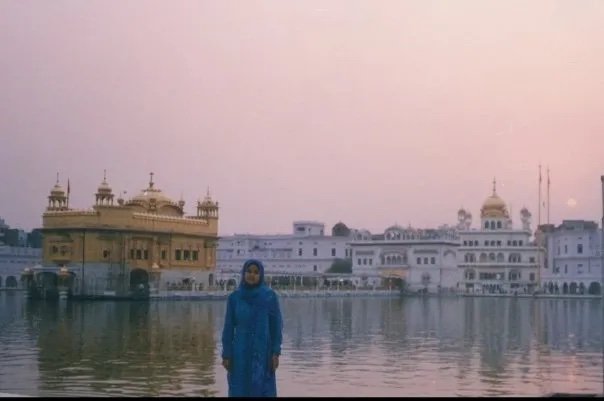What We Were Never Told: A Hindu Reckoning with 1984, State Violence, and Diasporic Silence
Originally Posted June 11, 2025
June 1st marks the 41st anniversary of Operation Blue Star, a violent military assault carried out by the Indian government in June 1984 on the Harmandir Sahib (Golden Temple), the holiest site in Sikhism, under the pretext of removing armed militants. The operation led to the deaths of hundreds of civilians and pilgrims, and is widely seen as the catalyst for the state-sanctioned anti-Sikh pogroms that followed, marking a deep and ongoing trauma for Sikh communities in India and across the diaspora.
I was a child in Canada in 1984 when Indian army tanks rolled into the Golden Temple.
I visited India later that same year, in late November, to attend my uncle’s wedding.
No one around me really talked about it.
No one explained why Sikhs were in mourning.
No one told me what it meant when the state turned on its own people.
Instead, there were whispers.
“They were extremists.”
“They brought it on themselves.”
“They were terrorists.”
What I didn’t know, what many hindu Canadians weren’t taught, is that the June 1984 assault on the Golden Temple was not a security operation. It was a calculated, state-sponsored massacre. And the horrors that followed in Delhi and beyond, weren’t “riots.” They were a genocide.
Now, decades later, I find myself sitting with the weight of that silence. As a hindu in the diaspora. As someone who has benefited from caste and religious privilege. As someone committed to truth, equity, and justice. And as someone who cannot look away.
(A visit to the Golden Temple in Amritsar in June, 2000)
Terrorism, or Resistance?
Language matters. When the Indian state used the word “terrorist,” it wasn’t just about weaponry or security, it was a political tool. A tool to de-legitimize a movement for justice, autonomy, and dignity. A tool to justify unspeakable violence.
"One person's terrorist is another person's freedom fighter." - Gerald Seymour
This strategy isn’t unique. Across the world, we see this same pattern:
Palestinians resisting occupation are labeled terrorists.
Black liberation leaders have been surveilled and vilified.
Dalit and Adivasi activists in India are imprisoned under fabricated charges.
Women and gender-diverse folks who resist gender-based violence are silenced or punished.
We must ask: Who gets labeled a threat?
And whose violence gets normalized as “order” or “peace”?
Hindu Voices for Sikh Sovereignty and Justice
While the dominant hindu response has too often been silence—or worse, justification, there have always been those who resisted.
Who stood up.
Who told the truth.
One such voice was Swami Agnivesh, a Hindu monk and human rights advocate, who fiercely condemned the anti-Sikh pogroms and called for reconciliation and justice. He stated:
“What happened in 1984 was a genocide, not a riot. The Indian state failed the Sikh community, and every Hindu who stays silent about it shares in that moral failure.”
Other progressive Hindu scholars, including those aligned with interfaith justice efforts, have reminded us that standing for the dignity of others is dharma. That our scriptures call us not to uphold oppressive order, but to disrupt it in the name of justice.
Intersections with Caste and Gender-Based Violence
1984 was not just about religion. It was about power. And the lengths to which systems will go to protect it.
Many of the women targeted during the pogroms were raped or sexually assaulted, their bodies used as weapons of war.
Many of the voices erased in the aftermath belonged to Dalit Sikhs, women, queer and trans people, whose grief and resistance were deemed inconvenient.
This is the same logic that sustains caste violence, that erases gendered trauma, and that punishes those who dare to speak truth to power. Whether it’s in India or in Canada, these systems travel, and so must our resistance.
A Call to Fellow Diasporic Hindus
To my fellow hindus in the diaspora, especially those of us who are savarna/privileged, dominant caste, and middle class—this is our work to do:
To learn the history we were never taught.
To listen deeply to Sikh voices still demanding justice.
To speak out against Hindutva ideology, state violence, and propaganda.
To challenge narratives that conflate sovereignty with extremism.
To reflect on how caste and religious supremacy benefit us.
And to act, not as saviors, but as co-strugglers in the work of liberation.
In the Words of Dr. B.R. Ambedkar:
“So long as you do not achieve social liberty, whatever freedom is provided by the law is of no avail to you.”
Let us not confuse legal democracy with social justice.
Let us not mistake state propaganda for truth.
Let us not claim neutrality when people are still grieving, still fighting, still remembering.
Reflect & Respond
As you read this, I invite you to sit with these questions:
What stories were you told, or not told about what happened in 1984 and Sikh resistance?
Where does your silence protect your comfort more than it protects justice?
What would it look like to use your privilege in service of truth and solidarity?
Let's Stay in This Together
If this post stirred something in you, rage, grief, curiosity, discomfort, you’re not alone. These reckonings are painful. But they are necessary.
At Mending the Chasm, I work with individuals, leaders, and organizations navigating hard truths and working toward equity, belonging, and repair. If you're looking to deepen this work—personally or professionally—let’s talk.
With care,
Leena Sharma Seth
Founder, Mending the Chasm
hindu, panjabi, brahmin, parent, facilitator, survivor, and student of justice

